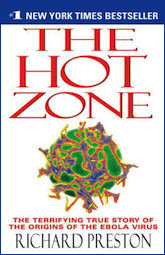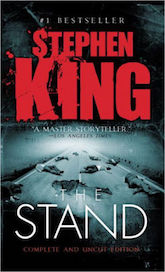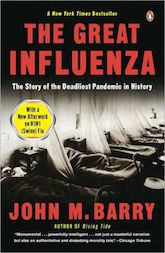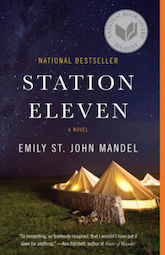So, when people want to know what subjects you’re interested in, they’re probably expecting to hear something like “art” or “the Boston Red Sox” or “Batman.” Not “ways in which thousands or even millions of people die.” Which is why I usually keep this fascination to myself—it sounds a little weird.
But I’ve been intrigued by plagues, pandemics, and epidemiology for decades now. Plague, Inc. was on my phone until I realized that this game was taking up time I needed to reserve for things like “work,” “eating,” and “sleep.” The Pandemic board game is played more frequently than any other at my house. And yes, I get a flu shot every year (and if you don’t have specific medical reasons to avoid it, you should too).
It was a book that first got me intrigued—infected me, you might say (if you have a weakness for puns, which I do). Books have taught me the facts of these diseases and about the incredible drama surrounding them, both in fiction and in reality.
The Hot Zone: A Terrifying True Story by Richard Preston
 I bought this book shortly after it came out in 1995, and I went to a nearby sandwich shop to have lunch and start reading. On that day I ordered tuna salad and alfalfa sprouts on pita bread. How do I remember this so vividly, more than 20 years later? Trust me, there’s nothing like trying to swallow your sandwich while you’re reading about someone’s insides basically liquefying during the final stages of the Ebola virus. Preston revealed the world of virology to the general public—in particular, the branches dedicated to emerging diseases of terrifying lethality.
I bought this book shortly after it came out in 1995, and I went to a nearby sandwich shop to have lunch and start reading. On that day I ordered tuna salad and alfalfa sprouts on pita bread. How do I remember this so vividly, more than 20 years later? Trust me, there’s nothing like trying to swallow your sandwich while you’re reading about someone’s insides basically liquefying during the final stages of the Ebola virus. Preston revealed the world of virology to the general public—in particular, the branches dedicated to emerging diseases of terrifying lethality.
Many critics now look at The Hot Zone as being overly alarmist—concentrating on and exaggerating the most grotesque details. (Your internal organs don’t literally liquefy from the Ebola virus; they just hemorrhage so badly it looks that way. Not sure why that info’s supposed to make Ebola sound better.) But there’s no denying that, through this book’s success, the public became much more aware of the need to research, treat and contain serious infectious illness.
Me? I was hooked for life.
The Stand by Stephen King
 Other epic plague stories have been written; by now Stephen King’s bibliography must be nearly as long as one of his novels. Yet I don’t think any fictional plague has ever horrified and fascinated more people than Captain Trips, and at least for me, The Stand may be King’s single greatest work.
Other epic plague stories have been written; by now Stephen King’s bibliography must be nearly as long as one of his novels. Yet I don’t think any fictional plague has ever horrified and fascinated more people than Captain Trips, and at least for me, The Stand may be King’s single greatest work.
In the first scene, a young guard violates quarantine protocol to escape from a military facility with his family. He thinks he can outrun the deadly biological weapon that’s been accidentally unleashed—but instead sets into motion a chain of infections that claims approximately 97% of the world’s population. King’s vision for the devolution of society—from fear to barbarity to silence—is as chilling as it is convincing. As for his descriptions of Captain Trips, aka Tubeneck … I have yet to meet one person who’s read The Stand who didn’t spend the first quarter of the book convinced they were catching a cold.
The Great Influenza by John M. Barry
 Undoubtedly you’ve heard about the Spanish flu—the one that came along about 100 years ago. You know it was pretty bad. But did you know that most estimates believe it killed more people than the medieval bubonic plague? Were you aware that in several U.S. cities, including Philadelphia, the deaths were so numerous and quick that officials resorted to piling hundreds of bodies into mass graves? I wasn’t, before I read this. Barry also explains how our society has managed to almost forget a Black Death-level global pandemic that took place only a century ago.
Undoubtedly you’ve heard about the Spanish flu—the one that came along about 100 years ago. You know it was pretty bad. But did you know that most estimates believe it killed more people than the medieval bubonic plague? Were you aware that in several U.S. cities, including Philadelphia, the deaths were so numerous and quick that officials resorted to piling hundreds of bodies into mass graves? I wasn’t, before I read this. Barry also explains how our society has managed to almost forget a Black Death-level global pandemic that took place only a century ago.
Station Eleven by Emily St. John Mandel
 Almost twenty years after humanity’s population is nearly wiped out by a global plague, a small Shakespearean troupe travels through a desolate landscape, united by the motto, “Survival is insufficient.” I’ll be honest: I have some issues with the epidemiology here. (Any virus that killed as quickly as the one she describes wouldn’t be able to spread worldwide; as anyone who’s played Plague, Inc. knows, viruses need hosts to remain ambulatory and contagious for a good long while if you want to wipe out civilization.) But the mechanics of the fictional disease are so beside the point. The excellence of Station Eleven lies in its vision of the world after the plague—the ways in which society, culture and art change in order to endure.
Almost twenty years after humanity’s population is nearly wiped out by a global plague, a small Shakespearean troupe travels through a desolate landscape, united by the motto, “Survival is insufficient.” I’ll be honest: I have some issues with the epidemiology here. (Any virus that killed as quickly as the one she describes wouldn’t be able to spread worldwide; as anyone who’s played Plague, Inc. knows, viruses need hosts to remain ambulatory and contagious for a good long while if you want to wipe out civilization.) But the mechanics of the fictional disease are so beside the point. The excellence of Station Eleven lies in its vision of the world after the plague—the ways in which society, culture and art change in order to endure.
And the Band Played On by Randy Shilts
 This closely reported, in-depth examination of the first years of the AIDS epidemic is one of the most moving, impactful books I’ve ever read. Further research in the years since its writing has contradicted some of the assertions here—but at the time, this book represented a huge leap forward in the public’s understanding of the disease and its early spread. What And the Band Played On does better than any other book I’ve read is showing the intersection of both science and society when it comes to understanding and treating disease. It manages to capture the global reach of the epidemic while still drawing intimate, moving portraits of some of those lost.
This closely reported, in-depth examination of the first years of the AIDS epidemic is one of the most moving, impactful books I’ve ever read. Further research in the years since its writing has contradicted some of the assertions here—but at the time, this book represented a huge leap forward in the public’s understanding of the disease and its early spread. What And the Band Played On does better than any other book I’ve read is showing the intersection of both science and society when it comes to understanding and treating disease. It manages to capture the global reach of the epidemic while still drawing intimate, moving portraits of some of those lost.
Top image: The Stand (1994)
 Claudia Gray is the New York Times bestselling author of many science fiction and paranormal fantasy books for young adults, including Defy the Stars, Defy the Worlds, the Firebird series, the Evernight series, the Spellcaster series, and Fateful. She’s also had a chance to work in a galaxy far, far away as the author of the Star Wars novels Lost Stars, Bloodline, and Leia, Princess of Alderaan. Born a fangirl, she loves obsessing over geeky movies and TV shows, as well as reading and occasionally writing fanfiction; however, she periodically leaves the house to go kayaking, do a little hiking, or travel the world. She will take your Jane Austen trivia challenge any day, anytime. Currently she lives in New Orleans.
Claudia Gray is the New York Times bestselling author of many science fiction and paranormal fantasy books for young adults, including Defy the Stars, Defy the Worlds, the Firebird series, the Evernight series, the Spellcaster series, and Fateful. She’s also had a chance to work in a galaxy far, far away as the author of the Star Wars novels Lost Stars, Bloodline, and Leia, Princess of Alderaan. Born a fangirl, she loves obsessing over geeky movies and TV shows, as well as reading and occasionally writing fanfiction; however, she periodically leaves the house to go kayaking, do a little hiking, or travel the world. She will take your Jane Austen trivia challenge any day, anytime. Currently she lives in New Orleans.











If you want a couple of nonfiction books about plagues, you should read David Quammen’s Spillover and The Chimp and the River. The first is an examination of how diseases jump from animals to humans, the second is specifically about the origins of AIDS.
Richard Preston also wrote a thriller called The Cobra Event, which is also all about plagues. It’s not necessarily all that well-written (there’s a reason for his collaborations with Lee Childs), but it’s pretty damn scary.
There’s also Frank Herbert’s The White Plague. Also not his best work, but one of the first engineered pandemic novels.
A couple I remember reading early on were George R. Stewart’s Earth Abides and John Christopher’s Empty World: I suppose Richard Matheson’s I Am Legend also counts. Good to see The Stand here but I think it needs its progenitor and companion piece, “Night Surf”.
Oldie by goodie – The Andromeda Strain.
EDIT @5 – Indeed!
How about Andromeda Strain? It’s a fairly contained plague and an extra-terrestrial one but I think it fits.
LOL @rob. Great minds think alike.
Let’s not forget Connie Willis’s Doomsday Book.
The first time I read The Stand, I went in knowing nothing at all about the story – and the day I started, I came down with one of the worst colds I have ever had in my life.
I don’t recommend doing that.
I’m currently reading The Dog Stars by Peter Heller and quite liking it. So far, it’s a quiet and tense look at a couple of survivors of a humanity ending flu-like epidemic.
I thought Station Eleven was very disappointing. It didn’t really seem tow ant to engage with it’s whole premise, and the flashbacks to before the plague weren’t very interesting to me. The fact that Emily St. John Mandel isn’t aware of any comics except Calvin and Hobbes when she has a character who wants to be a comic writer/illustrator also annoyed me, though more then it probably should have.
Robert McCammon’s “Swan Song” — I always think of this and King’s “The Stand” as bookends of a type. Although the world ended in flame (nuclear war), there is a plague which descends upon the survivors.
@DemetroisX It’s actually Douglas Preston (Richard’s brother) who collaborates with Lincoln Child (not Lee).
Albert Camus’s The Plague – not sure I buy the whole existentialist “all human life is a pestilence!” line, but the meditation on humanity in the wake of tragedy (something all these books at least implicitly share, I think) is beautiful and spot-on.
Mira Grant’s* NewsFlesh books. Cross a cure for cancer with one for the common cold, and what do you get?
ZOMBIES!
*Seanan McGuire
@Dean B: Doh! Well, Richard wrote the book I mentioned and at least he’s related to the other guy.
I recommend The Breeds of Man by FM Busby. Where by curing a plague they started a new plague, and by curing that they turned the entire human race into hermaphrodites and then had a collective panic attack. The message of the book is either learn to leave well enough alone and stop being dicks to people over gender identity.
The Immortals, by Tracy Hickman.
Hans Zinnser’s famous Rats, Lice, and History, and William McNeill’s Plagues and Peoples. Both older books, but very good non-fiction on the big-picture impact of epidemic disease on history.
In nonfiction, I’m partial to The Ghost Map by Steven Johnson, about the 1854 Broad Street cholera outbreak in London and the two men who strove to discover its source in a time when germ theory was little-known and such diseases were thought to be caused by breathing “bad air.” Their linking the patterns of cases to consumption of water from one cesspool-adjacent pump has been called “the founding event of epidemiology,” despite the autborities’ reluctance to accept its implications. I like the book’s interdisciplinary look at the social and biological aspects of the disease and how they changed through history before, during, and after the event.
Er.. The white plague? Another golden oldie.
@neaden: I totally agree about Station Eleven, and I’m rather surprised that a “plague nerd” would include a book in which the actual mechanics of the plague were so bad. I also thought a lot of the other mechanics were weak, leaving only the core conceit of the travelling show trying to bring art to the remaining masses–which has been done before.
A Journal of the Plague Year by Daniel Defoe. An 18th century novel about the 1665 plague in London. More contemporary is Year of Wonders by Geraldine Brooks which is a fictionalized account of the Plague outbreak in the village of Ryan in the same year. Both recommended.
Three non-fiction books:
“The Coming Plague” by Laurie Garrett has a look at several diseases including Ebola, Lassa, and Hanta virus.
“Living Terrors” by John Schwartz and Michael Osterholm about bio-terrorism.
“The Demon in the Freezer” by Richard Preston about anthrax, smallpox, and bio-terrorism.
Smallpox is believed to have killed more people in the 20th century than all forms of violence combined, and it was eradicated in the wild by 1975.
I’m surprised that no-one has mentioned either the fiction “Doomsday Book” by Connie Willis or the non-fiction “Guns, Germs and Steel” by Jared Diamond.
@22 read comment by @6.
Nonfiction, Virus X
Ditto on catching a cold while reading The Stand. Bonus points since I was reading the Re-release, and I got sick on the same days that were in that version of the book.
How about the first one, The Last Man, by Mary Shelley. It is so long and dreary.
what about “The White Plague” by Frank Herbert. A deranged biochemist creates a virus that kills only women, to get revenge for the murder of his wife. A great story
For those who comment on catching a cold while reading The Stand…
For me it turned out to be pneumonia. Both lungs.
How about Vonnegut’s Cat’s Cradle? Ice-9 for the win. And so it goes.
Jack London’s “The Scarlet Plague”.
I cannot remember the name of the author or the book, but my wife & I read a book after reading an article a dozen years ago in which it was said Michael Crichton was partially inspired to write “Jurassic Park” by the book plotted around a series of plagues as science goes wrong. I’ve searched for that reference by Crichton but can find no mention now.
The book was perhaps the most chilling either of us have read, it was so well laid out. As I recall just about every creature which could be a threat did in sequence.
If anyone can place the book/author from these scant clues, I would like to read it again. None of the references above seem to fit.
Thanks for sharing, I put several of the recommended books in my list. I have not yet finished but I am enthralled by The Great Mortality of John Kelly, about the plague in the middle ages.
Somewhat more humorously, there is L. Sprague DeCamp’s short story “Hyperpilosity,” where a virus causes everybody to grow fur all over their bodies. After some time when depilatories and razors sell out due to increased demand, everybody kind of gives up.
The clothing industry does not do well.
Welcome, Chaos by Kate Wilhelm. There’s an immortality treatment that kills half the people who use it. It can be administered, but it’s also sexually transmitted
World War Z by Max Brooks
Jump ball on which was better The book or movie but the movie was like a documentary